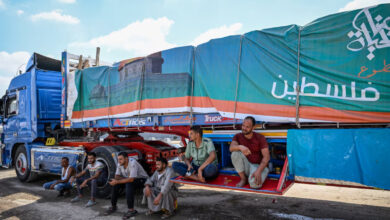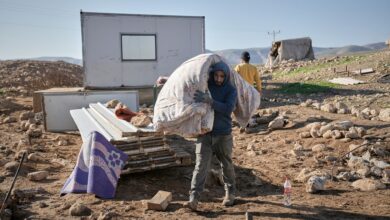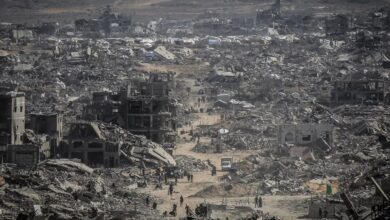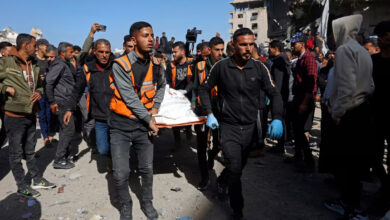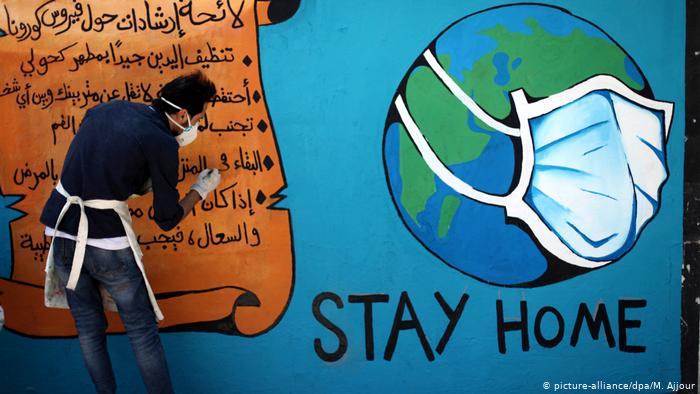
As the pandemic wreaks havoc across the region, people are rising to the challenge of combating the coronavirus. Refugees, fashion designers and entrepreneurs are taking the opportunity to help out their communities.
From mounting death tolls in Italy and the US to fractured responses to the global crisis, there is no shortage of tragedy across the globe. But even in such darkness, people have a way of bringing out the best of humanity.
In the Middle East, people across the region have launched personal initiatives to help their communities deal with the brunt of the outbreak. Where ill-equipped states have faltered, refugees, fashion designers and entrepreneurs have risen to the challenge by contributing to the production of essential medical supplies and protective gear to better serve their communities.
Safety in vogue
In Egypt, joining the fight against coronavirus is all the rage. Fashion designer Mohanad Kojak, who featured in the first season of Project Runway Middle East, said his studio is “donating 100% of our profit on selected best sellers … to the Abbasseya Fever Hospital in order to buy the needed equipment to help the medical team fight COVID-19 safely.”
“Due to the ongoing global pandemic, we at Kojak recognize our duty towards our nation and humanity,” his studio said in an Instagram post.
Lamia Rady, an upcoming Egyptian fashion designer who has already featured twice at Paris fashion week, started sewing masks for health-care workers. In an interview with independent news outlet Egyptian Streets, she said she wanted to “help my community in any way I could.”
“I found out that designers abroad are creating them because there is a need for them, there is a huge gap and hospitals are actually requesting hundreds,” Rady said. “They are reusable, they are going to last longer than the regular masks and you can change the filters, so they’re good for the environment.”
But the good will to help out one’s community doesn’t stop in Egypt.
‘My house is your house’
In Lebanon, a country long divided by sectarianism, initiatives have taken to connecting people and helping at-risk communities in the country.
Baytna Baytak — Arabic for “my house is your house” — aims to house medical staff next to their workplace by connecting them with nearby hosts. By easing the pressure of dealing with housing in Beirut and elsewhere in Lebanon, it hopes that healthcare workers can feel free to focus on their work.
“[Our] mission is to secure a location in which medical and Red Cross teams can sleep so they can focus on their daily duties,” Baytna Baytak said on its website.
Helping fellow refugees
Meanwhile, Jihad Muhammad, a Palestinian investor and founder of EvElectra electric car manufacturer, funded a makeshift factory produce masks with the design of the iconic Palestinian keffiyeh scarf.
The masks were made in one of the main Palestinian refugees camps in Beirut specifically for the community there. Human Rights Watch said last week that Palestinians in some municipalities in Lebanon face tougher restrictions than Lebanese or foreign nationals.
The factory manager told online news outlet Middle East Eye that they managed to produce 50,000 masks within the first five days. “He wanted to help his people and to help the people of the Palestinian refugee camps due to their economic conditions,” said the manager.
Transgressing borders
In the Gaza Strip, factories that once made clothes were repurposed to produce protective gear, including medical clothing and protective masks. After producing sufficient gear for the coastal enclave, items were exported to Israel and the West Bank as a friendly gesture.
In a region long fractured by identity, the coronavirus pandemic has to a certain extent brought vulnerable communities closer together.
___
By Lewis Sanders IV
Image: Anti-coronavirus graffiti in Gaza (@picture-alliance/dpa/M. Ajjour)

